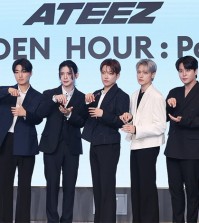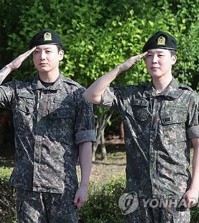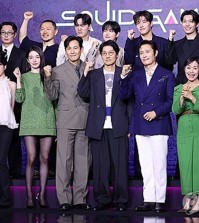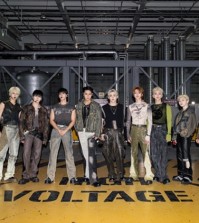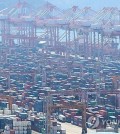- California Assembly OKs highest minimum wage in nation
- S. Korea unveils first graphic cigarette warnings
- US joins with South Korea, Japan in bid to deter North Korea
- LPGA golfer Chun In-gee finally back in action
- S. Korea won’t be top seed in final World Cup qualification round
- US men’s soccer misses 2nd straight Olympics
- US back on track in qualifying with 4-0 win over Guatemala
- High-intensity workout injuries spawn cottage industry
- CDC expands range of Zika mosquitoes into parts of Northeast
- Who knew? ‘The Walking Dead’ is helping families connect
KFA rejects Hong Myung-bo’s resignation offer
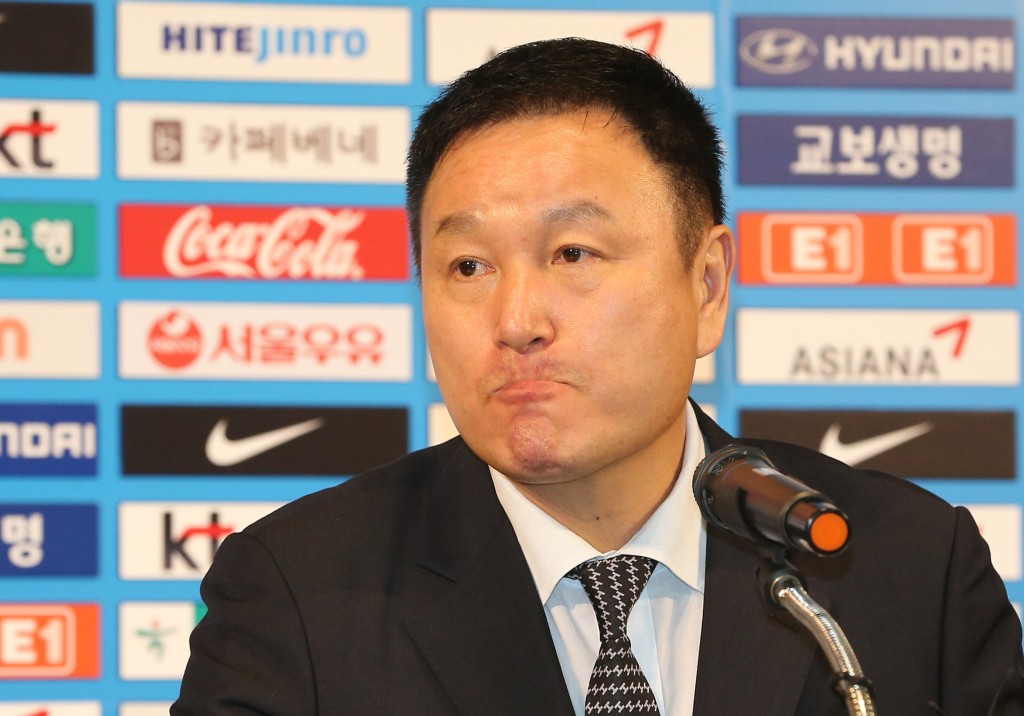
Huh Jung-moo, vice president of the Korea Football Association (KFA), fields a question during a press conference in Seoul on July 3, 2014. Huh announced the KFA rejected an earlier resignation offer by Hong Myung-bo, head coach of the men’s national team, in light of South Korea’s winless World Cup in Brazil. (Yonhap)
(Yonhap) — South Korea’s football governing body announced Thursday (KST) it has rejected a resignation offer by men’s national team head coach Hong Myung-bo in the wake of the country’s winless FIFA World Cup in Brazil.
At a press conference, Huh Jung-moo, vice president of the Korea Football Association (KFA), also said the beleaguered bench boss will stay on board for at least the remainder of his contract, which runs through the Asian Cup tournament in January 2015.
South Korea had one draw and two losses in Group H in Brazil, for its first winless World Cup since 1998. Hong had come under pressure to step down to take the fall for the performance but had been noncommittal about his future.
“Coach Hong’s resignation in light of the disappointing World Cup isn’t the best solution,” Huh said. “We’ve decided to trust him and support him going forward.”
Huh also revealed that Hong had offered to quit after South Korea’s 1-0 loss to Belgium in the final group match in Sao Paulo on June 26, a result that sealed the Asian side’s fate at the quadrennial tournament.
“We told him that quitting wasn’t going to be the answer, and persuaded him to lead the country again at the Asian Cup using this World Cup as a learning experience,” Huh said. “Hong said he will do his best at the Asian Cup.”
According to Huh, Hong had a change of heart after a recent meeting with KFA President Chung Mong-gyu.
Huh, who coached South Korea to the round of 16 at the 2010 FIFA World Cup in South Africa, noted that Hong only took over the national team in June last year and didn’t have enough time to prepare for the tournament.
“It’s also the KFA’s responsibility that Hong was only given a year to work,” Huh said.
Huh sidestepped questions on who will take the responsibility for the World Cup now that Hong will stay on. Huh, who served as the general manager of the national team in Brazil, said the KFA and Hong will continue to “seek ways to make improvements.”
“We’re going to carefully analyze everything that has gone on from start to finish,” Huh said. “Based on our findings, we will come up with measures to make things better. We’ve often seen one coach taking the fall for everything in the past, but I think we’ve wasted so much time with that. It’s a problem when a coach steps down just because he’s failed once.”
Pressed on what Hong will do to hold himself accountable, Huh said the coach is trying to do his part to improve the fortunes of South Korean football.
“More than anyone else, coach Hong is feeling responsible and is looking hard into reasons for his failure,” Huh said. “I think this experience will be a huge lesson for Hong and for football in this country.”
Hong faced criticism for some controversial selections for his 23-man squad. He chose forward Park Chu-young as his striker, though Park had played sparingly at club level in England and had battled nagging injuries for most of the year.
Park appeared in two matches and recorded just one shot, and left Brazil as a lightning rod for criticism and a symbol of all that went wrong for South Korea.
This year’s World Cup was essentially the first failure for Hong, who’d so far led a charmed life in football.








